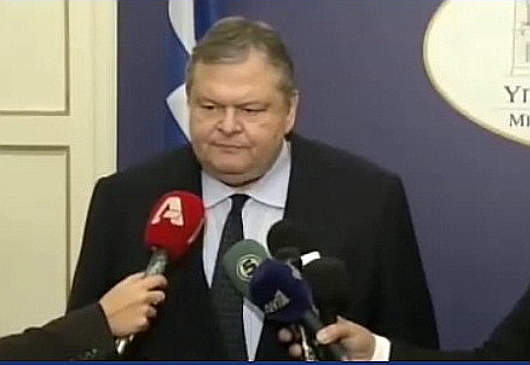 E. VENIZELOS: The National Council on Foreign Policy met here, at the Foreign Ministry, in a very serious climate of consensus. I would like to hope that this is a positive sign regarding the stance of all of the political forces at tomorrow’s meeting of the Standing Committee on Defense and Foreign Affairs, as well, and more generally as we go through a period full of challenges for our Nation and for our wider region.
E. VENIZELOS: The National Council on Foreign Policy met here, at the Foreign Ministry, in a very serious climate of consensus. I would like to hope that this is a positive sign regarding the stance of all of the political forces at tomorrow’s meeting of the Standing Committee on Defense and Foreign Affairs, as well, and more generally as we go through a period full of challenges for our Nation and for our wider region.
JOURNALIST: Mr. Deputy Prime Minister, what does Athens expect from the convening of the High-Level Cooperation Council. Could you perhaps tell us what issues will be on the agenda? The meetings you will have with your counterpart, as well as here in Athens, with Mr. Davutoglu, are, however, taking place with the “Barbaros” in the Cypriot EEZ. When was the date finalized?
E. VENIZELOS: In the National Council on Foreign Policy, we talked about the whole range of national issues and the issues of European external affairs, with emphasis on the Trilateral Summit Meeting in Cairo and, naturally, what is happening in the Cypriot EEZ; that is, a Turkish provocation that is a flagrant violation of international law and, more specifically, the International Law of the Sea.
This provocation, which is ongoing, has triggered a reaction from the international community, as well as our reaction. I remind you that we signed a very important agreement on search and rescue that joins the FIRs of Athens and Nicosia and the two corresponding maritime spaces. Moreover, the fact that we have this trilateral cooperation with Egypt and the upcoming Trilateral Meeting of the Foreign Ministry Secretaries General of Greece, Cyprus and Israel, this week, here in Athens, means a great deal. And I think that Turkey, as well, is reading with ease the message that is being sent, which is a message regarding the role of international law and the need for the International Law of the Sea to be in force in the Mediterranean, and for the Mediterranean to be a sea of peace, cooperation and prosperity for the peoples of the region.
Having taken all of these initiatives, and given that our number-one priority is to defend the international legal personality, the existence, the national sovereignty and sovereign rights of the Republic of Cyprus, and given that the intercommunal negotiations, as President Anastasiades has said, can resume only if the Turkish provocation ceases, and following consultation with the Republic of Cyprus on the highest possible level, as well as the dialogue we had with the Cypriot political parties, we decided, with the Prime Minister, that we mustn’t disrupt the timeline of the scheduled meetings between Greece and Turkey.
Because this is an open channel that, with authenticity, and without mediators, allows us to set out our national positions, to the benefit of Greece and the Republic of Cyprus, and to the benefit of peace and stability in the wider region. And you will allow me to say, as well, to the benefit of the international community, the European Union, and the Atlantic Alliance.
So in this sense we decided, following much thought, that I should also carry out my visit to Ankara. And as December is drawing near, that we should also carry out the Annual Regular High-Level Cooperation Council between the two governments. This was discussed by the two Prime Ministers by telephone and was decided upon following the Summit Meeting in Cairo. And the first issue that will be raised is, of course, respect for international law and respect for the existence and legal personality of the Republic of Cyprus.
JOURNALIST: Mr. Minister, it is true with regard to the Skopje issue that there is to be a meeting in New York in two days. Are you expecting a new proposal from Mr. Nimetz, something specific? Did you talk about it today?
E. VENIZELOS: We respect the process and Mr. Nimetz. We participate in good faith and in a constructive manner. We are awaiting steps from the other side. Our position is very clear, and it is a position that is in line with international law, as well as with the need for the wider region of southeast Europe to become a region of stability and prosperity.
November 10, 2014


